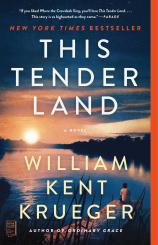Reading Group Guide
Discussion Questions
This Tender Land

1. Although Odie and Albert find themselves in a boarding school for Native American children, most of the Native children don’t actually speak in the story. The Native character whom readers get to know best is Mose, and he is mute and “speaks” only through sign language. Why do you think the author chose silence as a way of depicting the children at the school?
2. Trying to understand the nature of God is one of the many struggles for Odie during his experiences in the summer of 1932. Is Odie the only one struggling with this issue? What sense do you have concerning the way the other vagabonds feel about the nature of God? What about the people they meet on their travels? How does Odie’s relationship with God change over the course of his journey?
3. When Odie and Albert attempt to buy boots, the clerk is skeptical that Albert and Odie would be able to afford the $5 price tag. After Odie lies about getting the money from their father, a second clerk remarks, “If he got a job these days, he’s one of the lucky ones.” This is Odie and Albert’s first experience of life outside of the Lincoln School. What sense of the current state of the world do you get from this encounter?
4. When Odie is working for Jack in his orchard, Jack explain his religious philosophy, saying, “God all penned up under a roof? I don’t think so.” Where does Jack think God is really to be found? What is it in Odie’s experience that makes him disagree with Jack’s outlook?
5. After having escaped Jack, the vagabonds encounter a Native American man named Forrest. He appears friendly and shares a meal with them, but he’s also aware that there is a $500 reward for their capture --- a huge amount of money at the time. The children are unsure whether to trust him or not. What would you do in their situation?
6. Tent revivals --- places where Christians would gather to hear religious leaders speak --- were common in the Great Depression, often traveling across the country from town to town. They offered hope to people in desperate times, as Sister Eve does to Odie, Albert, Emmy and Mose. However, Albert is skeptical of Sister Eve’s healings, calling her a con. What do you believe about Sister Eve’s ability to heal? What is the con that Albert is warning Odie about?
7. Why does Odie trust Sister Eve so wholeheartedly, but not her partner, Sid? Do you think he’s right to draw the conclusions he does about Sid from their interactions? How do some of Odie’s misjudgments lead to disastrous consequences? In your opinion, is what happens to Albert in some way Odie’s fault?
8. When the vagabonds encounter the skeleton of a Native American boy, Albert says there’s nothing they can do, but Mose reacts very differently. Later, he wanders off from the group to learn about the Dakota Conflict of 1862, which resulted in the execution of 38 Sioux and the deaths of hundreds more. How does knowledge of this history change how Mose perceives himself? What impact does hearing this story have on Odie? On you?
9. Hoovervilles (named for President Herbert Hoover) were shantytowns that sprang up all across America during the Great Depression for homeless individuals and families. In difficult times like this, how do people like the Schofields survive? Is there an expectation that the government will help them, or do they look to other sources for assistance? How do the residents of this particular Hooverville pull together? How are they driven apart?
10. The Flats is like no other place the vagabonds have been on their journey. What makes it so unusual? When John Kelly is stopped by a policeman, why does he feel he has to say he is from a different part of town? Despite making a new friend, why is Odie so unhappy during the time he spends there?
11. When Odie is on his own, riding the rails, trying to get to St. Louis, he comes face to face with danger and violence. Do you think he was foolish for striking out alone? How was this encounter different from the things he experienced at Lincoln School?
12. Odie is a born storyteller even at his young age. Throughout the book he tells Albert, Emmy and Mose tales about an imp, a princess and the vagabonds. What purpose do these stories serve in the novel?
13. Sister Eve says to Odie that the only prayer she knows will absolutely be answered is a prayer for forgiveness. What do you think she means by this? Who are the people whom Odie needs to forgive, and for what reasons?
14. Odie, Albert, Mose and Emmy are all searching for peace and a place to call home. What do you think each character is looking for and what are their different definitions of home? In the end, do they all find what they are looking for? If so, how?
15. The author has said that he drew inspiration from the works of Mark Twain, Charles Dickens and Homer. Do you find elements of works by those authors in THIS TENDER LAND? Why or why not? Are there other authors whose work this story calls to mind?
16. In the story, Odie speaks of the journey he and the other are on as an odyssey. Do you see echoes of Homer’s epic poem in the children’s experiences? If so, can you identify Homer’s poetic counterpart for each section of the story?
This Tender Land
- Publication Date: May 26, 2020
- Genres: Fiction, Historical Fiction
- Paperback: 464 pages
- Publisher: Atria Books
- ISBN-10: 1476749302
- ISBN-13: 9781476749303







